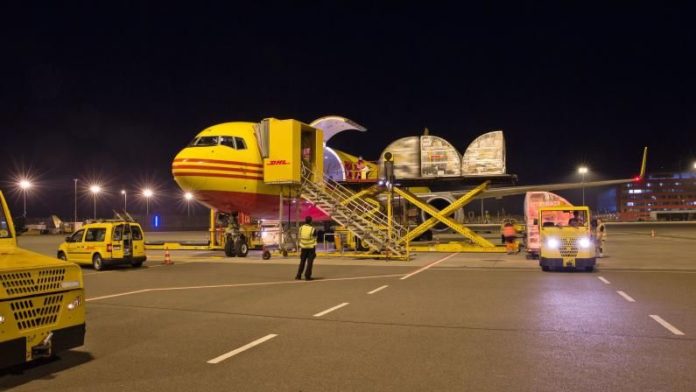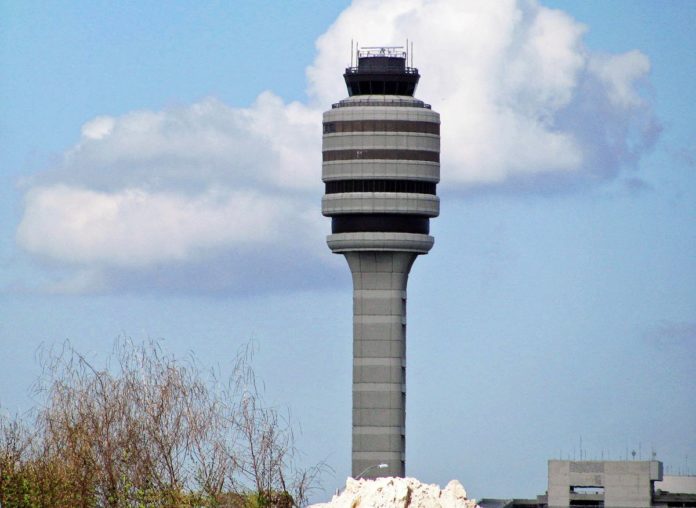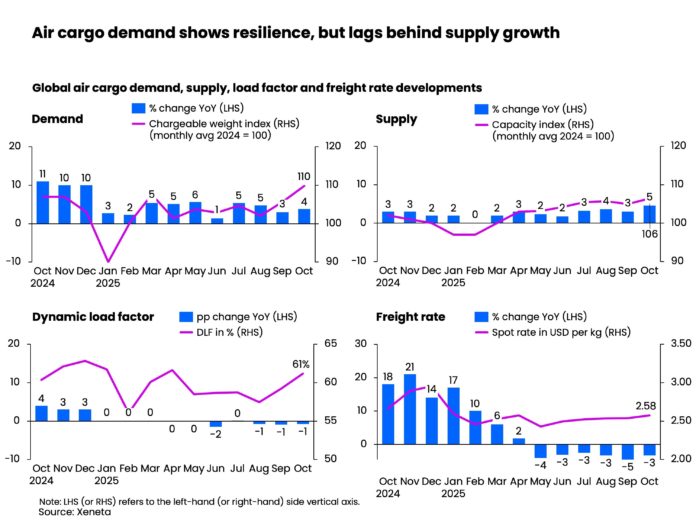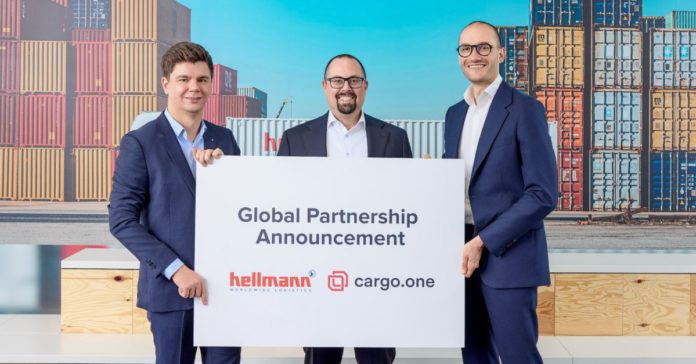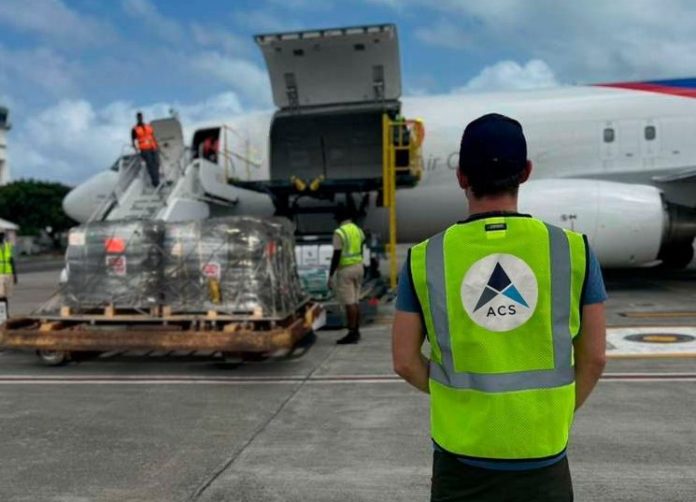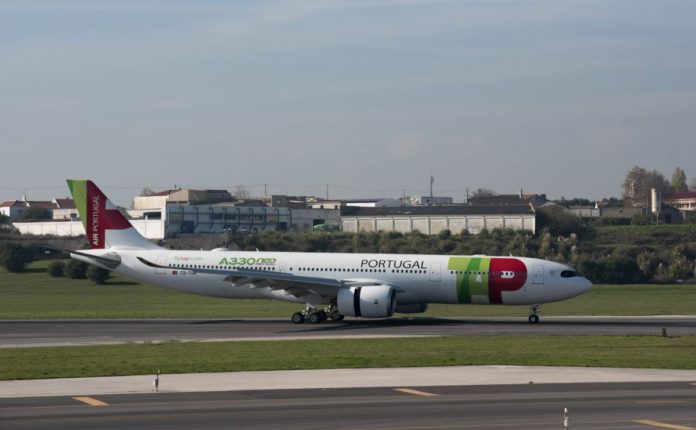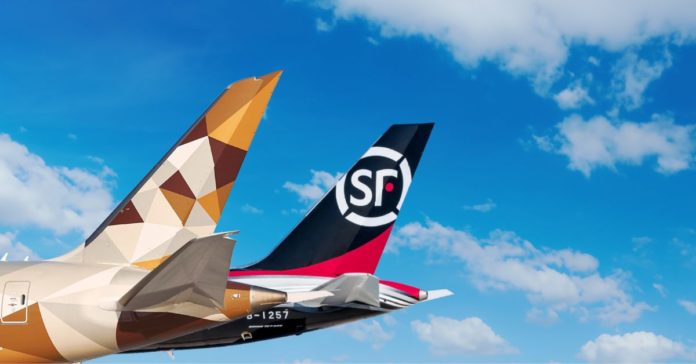DHL Group is to invest around €1 billion in India by 2030. The programme will include life sciences and healthcare, new energy, e-commerce, and digitalization. Major infrastructure developments include the ffirst DHL Health Logistics hub for DHL Supply Chain India in Bhiwandi, the country’s largest low-emission integrated operating facility for Blue Dart in Bijwasan, the first automatic sorting centre for DHL Express India in Delhi, a fifth DHL IT Services Centre in Indore, and electric vehicle and battery logistics centre of excellence in Chennai and Mumbai and the largest low-emission integrated ground hub for Blue Dart in Haryana.
No cost penalty for going green, says BioNatur
BioNatur’s biodegradable 100% recyclable stretch wrap now costs about the same as conventional plastic films, the manufacturer’s president and chief executive Chris Paladino told the Air Cargo Americas show on 13 November.
Paladion (pictured, left, with Charles Rick, vice president sales) said a change in BioNatur’s production process means that shippers and logistics providers can adopt the biodegradable wrap with little or no impact on operating costs, while meeting current compliance requirements and future-proofing against tightening international environmental standards, including European Union Scope 2 and 3 emissions reporting and forthcoming U.S. disclosure standards.
“By matching the cost of conventional stretch wrap, we are making the sustainable option the obvious one,” he said.
BioNatur stretch wrap biodegrades in an anaerobic environment, which includes most landfills.
It contains a small amount of a proprietary, food-safe, organic additive that attracts anaerobic bacteria and allows them to digest the plastic polymer without leaving microplastics or harmful residues.
Earlier this year, BioNatur established a European manufacturing partnership, enabling local production at price parity with traditional films and ensuring supply to operators across both regions.
CargoAi recruits strategy advisor
The CargoAi airfreight platform has appointed Wayne Tyndall as strategic advisor. He brings experience in building and scaling technology solutions for the global logistics industry, and at CargoAi will focus on organizational scaling, product excellence, and customer-centric innovation. During his time at WebCargo by Freightos and 7LFreight, he played a pivotal role in growing both teams and product offerings.
Longest-ever Federal shutdown comes to an end – updated
The longest government shutdown in US history has ended after 43 days, following the US administration’s annual wrangling over the Federal budget. The shutdown led to widespread delays and cancellations across the country, ias air traffic controllers and other professionals went unpaid.
In a statement welcoming the move American Airlines said however that the last few days of operations had already brought fewer delays and cancellations and that it was well positioned to recover quickly because of operational decisions to minimize disruption. It thanked its customers for their loyalty and patience throughout a challenging period.
The Airforwarders Association (AfA) also welcomed the end of the shutdown, and urged policymakers to reverse flight capacity reductions that caused around 10,000 flights to be cancelled and widespread disruption across the air cargo sector.
AfA said the reopening of government must include immediate steps to reimburse the 1.4 million unpaid federal workers, increase flight capacity, resume export license processing, and restore the stability that businesses and supply chains need.
Executive director, Brandon Fried, said: “We now need a rapid return to predictable operations. Forwarders and their customers have endured weeks of uncertainty, strained service levels, and reduced airport capacity.
“Restoring full staffing and reversing the cuts in flight capacity is essential to keeping cargo moving, protecting economic activity, and ensuring that federal employees who kept working during the shutdown are paid promptly.”
AfA said the escalating reductions in flight capacity highlighted the fragility of the system and the risks posed when key agencies, including the Federal Aviation Administration (FAA) and the Transportation Security Administration (TSA), operate with reduced resources.
Fried also called for clear communication on the timeline for reinstating full capacity, noting that forwarders require dependable schedules to meet customer commitments and maintain supply chain integrity.
October air cargo grows, but Europe-North America slump casts a shadow
Global air cargo volume growth slowed in October but still recorded a stronger than expected +4% rise year-on-year, despite the easing of frontloading of imports by businesses ahead of tariffs and the US de minimis ban, reports industry analysts Xeneta.
The latest monthly data supports Xeneta’s forecast in September of an overall +3-4% growth in demand for 2025, but more worrying trends indicate challenging times ahead as the market is “definitely starting to favour shippers more than it has for the past few years,” said chief airfreight officer, Niall van de Wouw.
October saw a sixth consecutive monthly fall in global air cargo spot rates, with a -3% decline year-on-year to US$2.58 per kg. Seasonal contract rates, valid for over a month, fell even faster than spot prices. Averaging $2.31 per kg, they were down -8% year-on-year, reflecting a subdued outlook among freight forwarders and carriers.
Van de Wouw warned falling volumes between Europe–North America – a market dominated by general air cargo and less exposed to the US de minimis ban – may be a “bellwether for the rest of global trade”. Despite the +4% growth in the global market, Europe-North America demand fell -6% year-on-year in October, while spot rates on the corridor rose a meagre +4% year-on-year, a sharp deceleration from the +23% annual growth seen earlier in 2025.
He said: “When we look at the global data for October, I would have expected the number to be closer to zero because of the busy Q4 for air cargo last year as well as the trade disruption still going on. But the numbers indicate it was stronger than anticipated. The consensus, however, is of a market slowing down, just not as fast as expected – and a -6% drop-off in volumes on the Transatlantic market, a major trade lane, is a harsh signal.”
October data underscored a cooling market, with demand lagging the +5% rise in supply for the second month this year.
Across the top three global trade lanes, air cargo peak season growth momentum remained subdued in October. Adjusting for distortions from Super Typhoon Ragasa by averaging late-September and Golden Week volumes, Asia Pacific to Europe cargo demand rose +11% in October versus August – well below the +16% gain recorded in the same period last year. Corresponding spot rates climbed +5%, but were well below the +9% rise seen a year earlier.
China-Europe e-commerce surge
E-commerce continued to propel Asia-Europe airfreight volumes as China’s e-commerce behemoths accelerated their share of markets outside of the US. China Customs data shows low-value and e-commerce sales to Europe surged +62% year-on-year in September, double the growth rate of a year ago and far outpacing China’s overall e-commerce expansion of +18%.
By contrast, China-to-US e-commerce shipments fell for the fifth straight month, down -34% year-on-year in September, though the decline moderated from a trough of -49% in June. As freighter capacity shifts from the Transpacific to the Asia-Europe corridor, spot rates from Northeast Asia to Europe also slipped, down -5% year-on-year, but still milder than the double-digit declines seen on Asia–North America routes.
Compared with two months earlier, the Northeast Asia and Southeast Asia to Europe corridors proved more resilient, with spot rates rising +6 and +7% respectively, versus -3% and +1% changes on the Northeast and Southeast Asia–North America routes respectively. Backhaul rates from North America to Northeast Asia showed a notable rebound, climbing +11% over the same period.
Transatlantic revenues disappoint
While the Transatlantic corridor is expected to see modest, supply-driven rate increases in the coming months as airlines trim capacity for the winter season, van de Wouw expects forwarders to emphasis “more focus on cost savings, because revenues will disappoint. You need to mind your costs more than when you’re supporting growth. The announcements by companies about reductions in cost are increasing left and right – and will continue – and we would not be seeing that if the market outlook was more positive.”
Van de Wouw adds: “For many major forwarders, organic market growth is not expected to be enough to keep their investors happy. So, as we head into 2026, I expect them to be going for market share. You can’t create more airfreight when the demand’s not there, so you’ve got to win it from someone else, and that will create more downward pressure on rates.
A buyer’s market
“When it comes to procuring freight transportation services, that will make the market more favourable to the buyers, not the sellers. However, lower rates will only benefit shippers if they can sell their products. I think most shippers would rather have 10% higher freight costs and 10% higher sales than 10% lower freight costs and 10% lower sales,” Van de Wouw continues.
“There’s no question that the airfreight market has gained from the global economic disruption and fears caused by tariffs, in particular – and it would be foolish to think the tariff situation will be over any time soon. But, as the noise starts to subside, the industry is being reminded that there is only limited growth in the general freight market and that is causing lower expectations for 2026.”
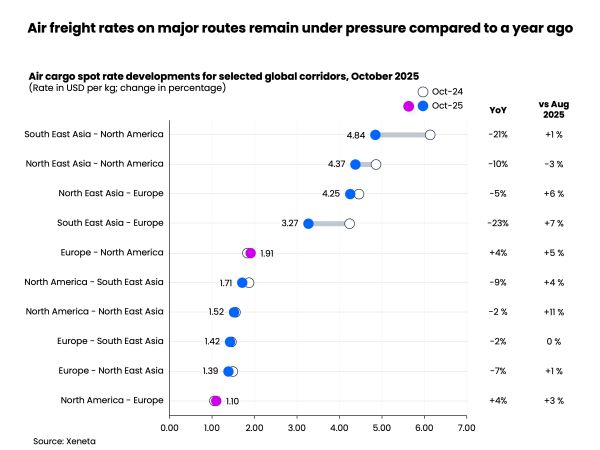
Cargo.one is platform for Hellmann growth
Hellmann Worldwide Logistics has signed a deal with Cargo.one to integrate a range of the airfreight platform’s technology including its Advanced Rate Management, Quotes API, Live Estimates data, and Cargo.one pro for procurement and sales of its air capacity.
Air freight quotations have become increasingly complex in recent years because of volatile market conditions, capacity constraints, and rising customer expectations for speed.
Hellmann’s upgraded infrastructure includes complete rate and charge management for its buy and sell rates, local charges and trucking costs, using Cargo.one’s Advanced Rate Management, customized to its needs. Cargo.one delivers enhanced rate visibility and global and local rate management and, by building Cargo.one’s Quotes API into its proprietary ‘HITS’ quotation system, fully integrated with its CargoWise One transport management system Hellmann can generate quotes at record speeds.
Chief operating officer for airfreight at Hellmann Worldwide Logistics, Martin Habisreitinger,commented, “The new technology significantly enhances the digital customer experience and marks a key milestone in realizing our strategic ambition, which places customer experience at the core of everything we do. Cargo.one’s technology equips Hellmann to gain full oversight over and competitive advantage from our air procurement function – allowing us to maximize upon our strong carrier relationships, optimize our rate setting, and drive competitive advantage.”
Air charterers step up to the mark for Jamaica
The air charter industry has stepped up to deliver relief to Jamaica following the devastation caused by Hurricane Melissa, with Air Charter Service alone arranging charters carrying more than 200 tons of aid, says the broker.
ACS director for government and humanitarian services Ben Dinsdale said that with warning that Melissa was going to strike Jamaica, it had been in touch with NGOs and governments in preparation for potential relief flights.
He added: “The air charter industry is always the first port of call when such disasters occur, and this was no different, with plans put in place before and directly after. We arranged the first non-military aid flight in last week, which was a Boeing B737-400F from Antigua into Montego Bay with 16 tons of shelter kits and blankets. Since then, we have booked charters through our London, Florida, California and Spanish offices, with several flights transporting more than 200 tons of aid in total throughout this week.
“Three of the island’s five airports are small, and not suitable for aircraft any larger than a private jet or turboprop, so we are utilising Kingston’s Norman Manley International and Montego Bay’s Sangster International, despite the latter sustaining some damage.
“We have also been involved in evacuations from the island on passenger aircraft, flying people to safety, and in some cases home, this past week. Once again we’re proud to work alongside our colleagues in the air charter industry, who always step up to the challenge during these times of need.”
TAP taps into south Brazil market
TAP Air Portugal is to launch three times weekly flights between Lisbon and Curitiba in southern Brazil on 2 July 2026. It will be operated by A330-200 aircraft and, after Curitiba, will serve Rio de Janeiro (before returning to Lisbon, on Tuesdays, Thursdays, and Saturdays. With the new addition, TAP will fly to 14 cities in Brazil, making it the European carrier with the most destinations in the country.
Etihad and SF up capacity
Etihad Cargo and SF Airlines have announced a capacity increase as part of a Joint Business Agreement signed in June. Integrating Etihad Cargo’s and SF Airlines’ freighter services brings the combined total of weekly flights to Shenzhen to nine and to Ezhou seven per week.
End of De Minimis – not all bad, says U-Freight
U-Freight Group (UFL) says recent changes to US trade policy; particularly the removal of the de minimis threshold for duty-free imports, could bring opportunities as well as threats to freight forwarders.
UFL reports that instead of shipping individual orders directly to US consumers from overseas, several of its clients are pivoting to bulk shipping models — moving inventory in larger volumes into the US for domestic storage and fulfilment.
It argues that shipping in bulk for local fulfilment offers several upsides. Businesses can now pay duties based on wholesale costs, which are typically lower than the retail value of individual DTC shipments. This allows them to avoid surprising customers with unexpected import fees, reduce per-unit shipping and logistics costs, improve delivery speeds by utilising US fulfilment centres and maintain price competitiveness in the U.S. market, even without the benefit of duty-free thresholds.
UF says its network of distribution centres and experience in cross-border e-commerce logistics makes it well-positioned to support businesses making this transition.
U-Freight America chief executive Rick Keller said: “This change is driving a reassessment of supply chain models. Many shippers are now identifying which of their SKUs previously benefited from the de minimis exemption. They are running detailed cost simulations that factor in duties, tariffs, and various fulfilment strategies to find the most economical way forward.”








